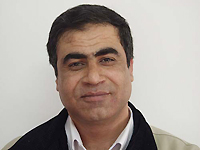
[ 2009.1. 7 ]

Jawad Harb (C)CARE | Jawad Harb is a Palestinian living in Rafah, Gaza, with his wife and six children. Harb has worked with CARE since 2002, managing a program supporting women's centres in Gaza. Since the conflict began Dec. 27, Harb's program has stopped operating because of the constant bombing. |
January 7, 2009
My child just started crying - she just heard on the news that Israel will start bombing our neighbourhood, because there are allegedly insurgents living here. She has been having nightmares that our house will be totally destroyed, and our family will die under it. She has seen the photos of other destroyed homes on TV.
She said to me, "Dad, if they bomb us, where are we going to go? What do we do? All the houses are targeted. We can't even run."
I didn't have an answer. My brain is totally paralyzed. I have a masters degree in psychology, but I have no idea how to counsel my own family.
For 10 days, the bombs have been falling. The nearest one destroyed a home 300 metres from where we live. My 12-year-old son is becoming an expert at pinpointing the distance of the bombs: "That one was 500 metres away, to the north," he says to me. He is always right. But this is not the kind of expertise I want my child to have.
I can't really describe what my children are feeling. They burst out crying when it is dark and cold, at night when we listen to the bombs like thunder.
We live in Rafah, about 500 metres from the border with Egypt. There are tunnels to Egypt nearby, which people use to smuggle food and supplies. So the bombing has been heavy here. Israel is trying to destroy the tunnels.
We don't have any bread. No fruit, no vegetables, no milk. The last time I ate meat was nine days ago, bought in the market. The market is closed now. There is no more food coming through the tunnels. We have just rice and macaroni for the children. We have no stocks. No biscuits for my children, like they used to eat. We survive, just.
This is the third day without electricity. We used to get electricity for three hours a day, but that stopped with the Israeli ground troops came in. My wife has to go out with the other women to find firewood because we have no electricity to cook. We have a three day supply of cooking fuel, but we are saving it for an emergency.
The water is almost gone. We hope we will get more tomorrow. Without electricity, the water pump doesn't work. I have a generator that we use a couple of hours a day, to watch the news, charge our mobile phones, and try to work. But the generator is not strong enough to run the water pump. I bought 10 days' worth of fuel, and it is almost gone.
We ran out of drinking water last night, so my nephew and I went out to the desalination station one kilometre away. We know there are bombs falling, but we can't live without water. We had to carry the 20-litre containers on our shoulders, because there is no transport. On our way home, a bomb fell nearby and we dropped the containers to take shelter - but we couldn't leave the water behind. But it is hard to run with a 20-litre container.
We fear everything. Every day, every sound. The children in my neighbourhood - and my kids - are not hoping to live. They don't think they will live. Instead, they are waiting to die, waiting for the bomb to fall. And they are asking me when it will happen.